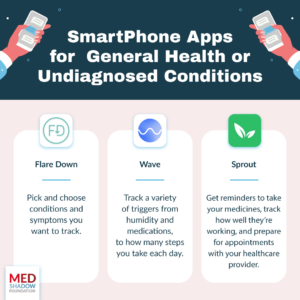Madeline Shonka told MedShadow it took her years to get an accurate lupus diagnosis. Even then, she had to go through trial and error with many different combinations of medications for treatment, all the while trying to decipher the best lifestyle changes to manage her condition. For example, she eventually discovered that making time for light exercise had a huge positive impact on her quality of life.
Jill Dehlin, an RN who suffers from migraines, told MedShadow that tracking her symptoms helped immensely.
“I recommend to everyone that I speak with to keep a journal or diary and keep track of how many days a week, how many times a day you are having head pain and the nature of the head pain,” said Dehlin. “The nature of the head pain is really important because [a] migraine has specific symptoms: one-sided throbbing, light sensitivity, sound sensitivity, sensitivity to fragrances, nausea, vomiting, GI problems, dizziness, [and] visual problems. A person should be documenting these kinds of symptoms [regularly].”
Many illnesses and disorders flare up based on your exposure to certain triggers such as foods, sunlight, temperature, and stress. Unfortunately, the experiences that set off symptoms in one person are often different from those for another individual, even if they have the same condition.
Symptom Tracker Options
Keeping track of the activities that lead up to your flare ups can help you identify your own individual triggers which may allow you to manage many chronic conditions with less or even no medication. You can create your own symptom tracker journal. Additionally, companies have started selling symptom tracking journals and smartphone apps that can help you monitor your health and identify your personal triggers. These can help you structure your notes and make it easy to also share with your healthcare provider, if you like. Some disease-specific foundations offer specialized symptom trackers for free.
Similar journals and symptom tracker apps can help you manage side effects of any medications, too. Keeping track of when you were prescribed certain drugs, changed a dosage, or started taking a certain supplement can help you recognize the causes of certain side effects so you can work with your doctor or pharmacist to make your treatment regimen more manageable.
If you have any chronic condition in which your symptoms wax and wane over time, it’s likely you could benefit from tracking your symptoms. Some examples of these conditions include:
Some apps and diaries are made to be used for any condition or new drug. They may be able to help your healthcare team track your symptoms and arrive at a diagnosis. Others are specific to your diagnosis.
Trackers for General Health or Undiagnosed Conditions
This app lets you pick and choose conditions and symptoms you want to track, rather than being specialized to just one. The app boasts that it can help you manage any condition. You can monitor triggers such as diet, weather, activity, as well as supplements and natural remedies.
The Wave app allows you to track a variety of triggers from humidity and medications, to how many steps you took each day, along with any symptoms you experience. The app draws insights and helps you make connections between triggers, symptoms, and your overall health.
Sprout is designed to remind you when to take your medicines, to track how well they’re working, and help you prepare for appointments with your healthcare provider.
Symptom Trackers for Digestive Disorders

This app is designed for people with IBS, acid reflux, Crohn’s, Colitis, and other digestive disorders. It prompts users to track their food intake, stress levels, and other variables. It provides resources, too, such as a personalized plan, meditations for stress relief, and access to a dietician.
The app prompts you to record the foods you eat along with your levels of stress, fatigue, and digestive symptoms. It creates visual reports and can send data to your healthcare provider, if desired.
147 Personal Daily Diary for IBS
For those among us who prefer handwriting our journals or are wary of data privacy with digital apps, this free printable journal template can help. The International Foundation for Gastrointestinal Disorders recommends using it for at least two to four weeks, then bringing it with you to discuss with your healthcare provider.
Trackers for Headaches and Migraines

This app allows you to collect the details of each migraine attack, including pain severity and any triggers you can identify. It tracks the weather in your area to help recognize if certain conditions can set off a migraine for you. The app also provides advice and community forums.
This app is designed to be used by both you and your physician. You enter data about your symptom severity and duration, how well your treatments are working, and any triggers you notice. You can then chat with your healthcare provider and other anonymous patients directly through the app.
National Headache Foundation Diary
The National Headache Foundation provides a free printable template for you to keep a diary of your migraine symptoms.
Lupus Symptom Trackers

You can purchase this 90-day journal from Amazon to monitor your daily symptoms and identify triggers.
The Care Clinic app prompts you to record a variety of lupus symptoms such as rashes and pain over time, and assess the efficacy of your medications, while also identifying outside triggers, such as diet and menstrual cycle.
Multiple Sclerosis Symptom Trackers
This free app was built by the Multiple Sclerosis Association of America to help you track your symptoms and set medication reminders. It analyzes the data you enter and allows you to share reports with your healthcare providers.
This hard-copy journal has a year’s worth of pages to help keep track of daily, weekly, and monthly changes in your condition and questions you don’t want to forget to ask your healthcare provider.




 My MS Manager
My MS Manager


